| Mah?tm? Mohandas Karamchand Gandhi | |
|---|---|
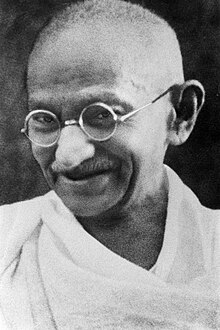 | |
| Native name | ??????? ?????? ????? |
| Born |
Mohandas Karamchand Gandhi 2 October 1869 Porbandar, Porbandar State, Kathiawar Agency, Bombay Presidency, British India (present-day Gujarat, India) |
| Died |
30 January 1948 (aged 78) New Delhi, Delhi, Dominion of India (present-day India) |
| Cause of death | Assassination |
| Resting place | Raj Ghat, Delhi, India |
| Nationality | Indian |
| Other names | Mahatma Gandhi, Bapu ji, Gandhi ji |
| Alma mater |
University College London Inner Temple |
| Occupation |
|
| Known for |
Indian Independence Movement, Peace movement, Nonviolent resistance, Civil resistance, Gandhism |
| Political party | Indian National Congress |
| Movement | Indian independence movement |
| Spouse(s) | Kasturba Gandhi (m. 1883; d. 1944) |
| Children |
|
| Parents |
|
| Signature | |
 | |
Mohandas Karamchand Gandhi (/????ndi, ![]() listen); 2 October 1869 – 30 January 1948) was an Indian activist who was the leader of the Indian independence movement against British rule. Employing nonviolent civil disobedience, Gandhi led India to independence and inspired movements for civil rights and freedom across the world. The honorific Mah?tm? (Sanskrit: "high-souled", "venerable")—applied to him first in 1914 in South Africa—is now used worldwide. In India, he is also called Bapu (Gujarati: endearment for father, papa) and Gandhi ji, and known as the Father of the Nation.
listen); 2 October 1869 – 30 January 1948) was an Indian activist who was the leader of the Indian independence movement against British rule. Employing nonviolent civil disobedience, Gandhi led India to independence and inspired movements for civil rights and freedom across the world. The honorific Mah?tm? (Sanskrit: "high-souled", "venerable")—applied to him first in 1914 in South Africa—is now used worldwide. In India, he is also called Bapu (Gujarati: endearment for father, papa) and Gandhi ji, and known as the Father of the Nation.
Born and raised in a Hindu merchant caste family in coastal Gujarat, India, and trained in law at the Inner Temple, London, Gandhi first employed nonviolent civil disobedience as an expatriate lawyer in South Africa, in the resident Indian community's struggle for civil rights. After his return to India in 1915, he set about organising peasants, farmers, and urban labourers to protest against excessive land-tax and discrimination. Assuming leadership of the Indian National Congress in 1921, Gandhi led nationwide campaigns for various social causes and for achieving Swaraj or self-rule.
Gandhi famously led Indians in challenging the British-imposed salt tax with the 400 km (250 mi) Dandi Salt March in 1930, and later in calling for the British to Quit India in 1942. He was imprisoned for many years, upon many occasions, in both South Africa and India. He lived modestly in a self-sufficient residential community and wore the traditional Indian dhoti and shawl, woven with yarn hand-spun on a charkha. He ate simple vegetarian food, and also undertook long fasts as a means of both self-purification and political protest.
Gandhi's vision of an independent India based on religious pluralism, however, was challenged in the early 1940s by a new Muslim nationalism which was demanding a separate Muslim homeland carved out of India. Eventually, in August 1947, Britain granted independence, but the British Indian Empire was partitioned into two dominions, a Hindu-majority India and Muslim-majority Pakistan. As many displaced Hindus, Muslims, and Sikhs made their way to their new lands, religious violence broke out, especially in the Punjab and Bengal. Eschewing the official celebration of independence in Delhi, Gandhi visited the affected areas, attempting to provide solace. In the months following, he undertook several fasts unto death to stop religious violence. The last of these, undertaken on 12 January 1948 when he was 78, also had the indirect goal of pressuring India to pay out some cash assets owed to Pakistan. Some Indians thought Gandhi was too accommodating. Among them was Nathuram Godse, a Hindu nationalist, who assassinated Gandhi on 30 January 1948 by firing three bullets into his chest. Captured along with many of his co-conspirators and collaborators, Godse and his co-conspirator Narayan Apte were tried, convicted and executed while many of their other accomplices were given prison sentences.
Gandhi's birthday, 2 October, is commemorated in India as Gandhi Jayanti, a national holiday, and worldwide as the International Day of Nonviolence.
Contents
Biography
Early life and background
Mohandas Karamchand Gandhi was born on 2 October 1869 to a Hindu Modh Baniya family in Porbandar (also known as Sudamapuri), a coastal town on the Kathiawar Peninsula and then part of the small princely state of Porbandar in the Kathiawar Agency of the Indian Empire. His father, Karamchand Uttamchand Gandhi (1822–1885), served as the diwan (chief minister) of Porbandar state.
Although he only had an elementary education and had previously been a clerk in the state administration, Karamchand proved a capable chief minister. During his tenure, Karamchand married four times. His first two wives died young, after each had given birth to a daughter, and his third marriage was childless. In 1857, Karamchand sought his third wife's permission to remarry; that year, he married Putlibai (1844–1891), who also came from Junagadh, and was from a Pranami Vaishnava family. Karamchand and Putlibai had three children over the ensuing decade: a son, Laxmidas (c. 1860 – March 1914); a daughter, Raliatbehn (1862–1960); and another son, Karsandas (c. 1866–1913).
On 2 October 1869, Putlibai gave birth to her last child, Mohandas, in a dark, windowless ground-floor room of the Gandhi family residence in Porbandar city. As a child, Gandhi was described by his sister Raliat as "restless as mercury, either playing or roaming about. One of his favourite pastimes was twisting dogs' ears." The Indian classics, especially the stories of Shravana and king Harishchandra, had a great impact on Gandhi in his childhood. In his autobiography, he admits that they left an indelible impression on his mind. He writes: "It haunted me and I must have acted Harishchandra to myself times without number." Gandhi's early self-identification with truth and love as supreme values is traceable to these epic characters.
The family's religious background was eclectic. Gandhi's father Karamchand was Hindu and his mother Putlibai was from a Pranami Vaishnava Hindu family. Gandhi's father was of Modh Baniya caste in the varna of Vaishya. His mother came from the medieval Krishna bhakti-based Pranami tradition, whose religious texts include the Bhagavad Gita, the Bhagavata Purana, and a collection of 14 texts with teachings that the tradition believes to include the essence of the Vedas, the Quran and the Bible. Gandhi was deeply influenced by his mother, an extremely pious lady who "would not think of taking her meals without her daily prayers...she would take the hardest vows and keep them without flinching. To keep two or three consecutive fasts was nothing to her."
In 1874, Gandhi's father Karamchand left Porbandar for the smaller state of Rajkot, where he became a counsellor to its ruler, the Thakur Sahib; though Rajkot was a less prestigious state than Porbandar, the British regional political agency was located there, which gave the state's diwan a measure of security. In 1876, Karamchand became diwan of Rajkot and was succeeded as diwan of Porbandar by his brother Tulsidas. His family then rejoined him in Rajkot.
At age 9, Gandhi entered the local school in Rajkot, near his home. There he studied the rudiments of arithmetic, history, the Gujarati language and geography. At age 11, he joined the High School in Rajkot. He was an average student, won some prizes, but was a shy and tongue tied student, with no interest in games; his only companions were books and school lessons.
While at high school, Gandhi's elder brother introduced him to a Muslim friend named Sheikh Mehtab. Mehtab was older in age, taller and encouraged the strictly vegetarian boy to eat meat to gain height. He also took Mohandas to a brothel one day, though Mohandas "was struck blind and dumb in this den of vice," rebuffed the prostitutes' advances and was promptly sent out of the brothel. The experience caused Mohandas mental anguish, and he abandoned the company of Mehtab.
In May 1883, the 13-year-old Mohandas was married to 14-year-old Kasturbai Makhanji Kapadia (her first name was usually shortened to "Kasturba", and affectionately to "Ba") in an arranged marriage, according to the custom of the region at that time. In the process, he lost a year at school, but was later allowed to make up by accelerating his studies. His wedding was a joint event, where his brother and cousin were also married. Recalling the day of their marriage, he once said, "As we didn't know much about marriage, for us it meant only wearing new clothes, eating sweets and playing with relatives." However, as was prevailing tradition, the adolescent bride was to spend much time at her parents' house, and away from her husband. Writing many years later, Mohandas described with regret the lustful feelings he felt for his young bride, "even at school I used to think of her, and the thought of nightfall and our subsequent meeting was ever haunting me." He later recalled feeling jealous and possessive of her, such as when she would visit a temple with her girlfriends, and being sexually lustful in his feelings for her.
In late 1885, Gandhi's father Karamchand died. Gandhi, then 16 years old, and his wife of age 17 had their first baby, who survived only a few days. The two deaths anguished Gandhi. The Gandhi couple had four more children, all sons: Harilal, born in 1888; Manilal, born in 1892; Ramdas, born in 1897; and Devdas, born in 1900.
In November 1887, the 18-year-old Gandhi graduated from high school in Ahmedabad. In January 1888, he enrolled at Samaldas College in Bhavnagar State, then the sole degree-granting institution of higher education in the region. But he dropped out and returned to his family in Porbandar.
English barrister
Gandhi came from a poor family, and he had dropped out of the cheapest college he could afford. Mavji Dave Joshiji, a Brahmin priest and family friend, advised Gandhi and his family that he should consider law studies in London. In July 1888, his wife Kasturba gave birth to their first surviving son, Harilal. His mother was not comfortable about Gandhi leaving his wife and family, and going so far from home. Gandhi's uncle Tulsidas also tried to dissuade his nephew. Gandhi wanted to go. To persuade his wife and mother, Gandhi made a vow in front of his mother that he would abstain from meat, alcohol and women. Gandhi's brother Laxmidas,
Watch movie Gandhi online on Amazon
Watch movie Gandhi online
Watch The Movie On PrimeAaj Aur Kal Full HD Movie Download
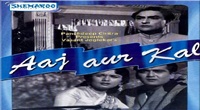
Alag Alag Full HD Movie Download
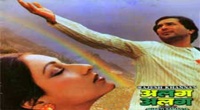
Meharbani (1982) Full HD Movie Download
.jpg)
Khandaan (1975) Full HD Movie Download
.jpg)
Tawaif Full HD Movie Download
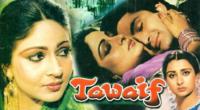
International Crook Full HD Movie Download

Kahaani Gudiya Ki Full HD Movie Download

Aankhen (1993) Full HD Movie Download
.jpg)
Yuga Full HD Movie Download

Jay Maa Full HD Movie Download

Carnival Full HD Movie Download

Gadvasu Pindam Full HD Movie Download

Aasthulu Anthasthulu Full HD Movie Download
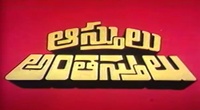
Chandipriya Full HD Movie Download
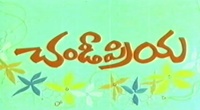
Poochho Mere Dil Se (2004) Full HD Movie Download
.jpg)
Labaad Kuthli Full HD Movie Download
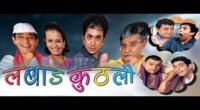
The Dark Knight Full HD Movie Download

Mulla Nasaruddin Full HD Movie Download

Padavi Pramanam Full HD Movie Download
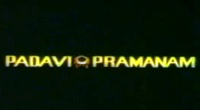
Pilla Piduga Full HD Movie Download
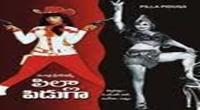
Lakshmi Kataksham Full HD Movie Download
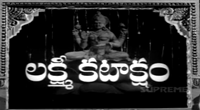
Download latest Movie from bollywood
- 1> baaghi 3
- 2> THE SKY IS PINK MOVIE FULL STORY AND REVIEW
- 3> Luka Chuppi
- 4> TO ALL THE BOYS I’VE LOVED BEFORE
- 5> Kabir Singh
- 6> Street Dancer 3D
- 7> Simmba
- 8> Gone Girl
- 9> The Girl Who Lived
- 10> Ludo
- 11> DILWALE DULHANIA LE JAYENGE
- 12> GUILTY
- 13> The Godfather
- 14> Adventures of Rusty
- 15> Sooryavanshi
- 16> Satyameva Jayate 2
- 17> Thappad
- 18> Bhool Bhulaiyaa 2
- 19> KGFChapter 2
- 20> Mardaani 2
- 21> Pinjar
- 22> Shivaji maharaj
- 23> Ek Villian 2
- 24> Hungama 2
- 25> Divergent
- 26> Mumbai Saga
- 27> The Internship
- 28> HIT (telugu)
- 29> Panga
- 30> The perfect date
- 31> 16 December
- 32> Gopala Gopala (Telugu)
- 33> Brahmastra
- 34> Gangubai Kathiawadi
- 35> Manmadhudu
- 36> Nenu local
- 37> Mahanati
- 38> Shatamanam bavathi
- 39> Lagaan
- 40> After
- 41> MOM
- 42> Shamshera
- 43> Raguvaran BTech
- 44> Khakee
- 45> The villain
- 46> OM
- 47> Mr. perfect
- 48> Bueatifull mind
- 49> Hichki
- 50> Gabbar Singh
- 51> Jogi
- 52> Before Sunrise
- 53> Before Sunset
- 54> Before Midnight
- 55> The Big Bull
- 56> Top Gun: Maverick
- 57> The Purge
- 58> The Sky is Pink
- 59> Laxmmi Bomb
- 60> Sadak 2
- 61> Sufna
- 62> Prithviraj
- 63> PK
- 64> Coolie No 1(2020)
- 65> Black Widow
- 66> Dear Zindagi
- 67> Dil Bechara
- 68> PHIR HERA PHERI
- 69> WAR
- 70> Dostana
- 71> RRR: Roudram Ranam Rudhiram
- 72> Maidan
- 73> Dabbang 3
- 74> Chhalaang
- 75> life as we know it
- 76> SherShaah
- 77> Sandeep Aur Pinky Faraar
- 78> Event Horizon
- 79> 83
- 80> Radhe: Your Most Wanted Bhai
- 81> Gunjan Saxena: The Kargil Girl
- 82> Mr India
- 83> Vivah
- 84> Anokha Bandhan
- 85> Ghost
- 86> Bhoot: Part One - The Haunted Ship
- 87> Haseen Dilruba
- 88> Laal Singh Chaddha
- 89> Qismat
- 90> Rajput
- 91> Drive
- 92> Dil Chahta Hai
- 93> Dil Ki Baazi
- 94> Dil Ka Rishta
- 95> Teesri Manzil
- 96> Dil
- 97> Love Aaj Kal
- 98> Khaali Peeli
- 99> Bunty Aur Babli 2
- 100> Atrangi Re
- 101> Gulabo Sitabo
- 102> Jodi
- 103> Suraj Pe Mangal Bhari
- 104> Deewana
- 105> Attack
- 106> Sardar Udham Singh
- 107> Toofan
- 108> THE LOVEBIRDS
- 109> Jersey
- 110> Ginny Weds Sunny
- 111> Thalaivi
- 112> Shiddat
- 113> Angels vs Zombies
- 114> Koi Mil Gya
- 115> Thank God
- 116> Bhuj: The Pride of India
- 117> Hum Aapke Hain Kaun
- 118> The Platform
- 119> Bird Box
- 120> Roohi Afzana
- 121> Torbaaz
- 122> Nikamma
- 123> World War Z
- 124> Extraction
- 125> Train to Busan
- 126> Life of Pi
- 127> SHAADI MEIN JROOR AANA
- 128> Himmat Aur Mehnat
- 129> To All The Boys: P.S. I Still Love You
- 130> Mimi
- 131> Good Newwz
- 132> Shubh Mangal Zyada Saavdhan
- 133> Raabta
- 134> Harry Potter and the Philosopher's Stone
- 135> Harry Potter and the Chamber of Secrets
- 136> Chhapaak
- 137> War of the Worlds
- 138> Harry Potter and the Prisoner of Azkaban
- 139> Harry Potter and the Goblet of Fire
- 140> MURDER MYSTERY
- 141> Shakuntala Devi
- 142> Bachchan Pandey
- 143> Jayeshbhai Jordar
- 144> Sheer Qorma
- 145> Saina
- 146> 'O' Pushpa I hate tears
- 147> Kedarnath
- 148> MS Dhoni The Untold Story
- 149> Chhichhore
- 150> Badhaai Ho
- 151> Unstoppable
- 152> Oz the Great And Powerful
- 153> The Girl on the Train
- 154> Haathi Mere Saathi 2020
- 155> The Conjuring: The Devil Made Me Do It
- 156> Gandhi Se Pehle Gandhi
- 157> The Song of Scorpions
- 158> Srimanthudu
- 159> Hello Guru Prema Kosame
- 160> Beauty and The Beast
- 161> Black Panther
- 162> Charlie and the Chocolate Factory
- 163> Bole Chudiyan
- 164> Fidaa
- 165> Duvvada Jagannadham
- 166> Bruce Lee: The Fighter
- 167> Hyper
- 168> Yaara
- 169> Red (2020)
- 170> Shivam
- 171> That Is Mahalakshmi
- 172> Nishabdham
- 173> Aashram 2020 web series
- 174> Laxmii
- 175> Mismatched
- 176> STUDENT OF THE YEAR 2
- 177> NAIL POLISH
- 178> Ramprasad Ki Tehrvi
- 179> KAAGAZ
- 180> 12 o Clock
- 181> The Power
- 182> bolo hau
- 183> Tribhanga
- 184> JAMUN
- 185> Madam Chief Minister
- 186> Maasaab
- 187> Aadhaar
- 188> Tanhaji
- 189> Bhaagi 3
- 190> Bhootnath
- 191> MALANG
- 192> Jai Mummy Di
- 193> Haathi Mere Saathi 2021
- 194> Shakeela
- 195> Unpaused
- 196> Annayya
- 197> Vamsoddharakudu
- 198> Mrugaraju
- 199> Narasimha Naidu
- 200> Sankranti
- 201> Manasu Maata Vinadhu
- 202> Anjaane
- 203> Apaharan
- 204> Bachke Rehna Re Baba
- 205> Bewafaa
- 206> Roohi
- 207> Radhe
- 208> Zindagi Khoobsoorat Hai
- 209> Yeh Mohabbat Hai
- 210> Yeh Kya Ho Raha Hai?
- 211> The Tomorrow War
- 212> DehradunDiary
- 213> Meri Shaadi Karaoo
- 214> Matruu Ki Bijlee Ka Mandola
- 215> No One Killed Jesica
- 216> Aag Ka Goola
- 217> Eight Million Dollars
- 218> Three Hundred
- 219> Cats and Dog
- 220> Decoy
- 221> Gold Rush
- 222> You Have Got Mail
- 223> Final Destination three
- 224> Tofan
- 225> Jungle
